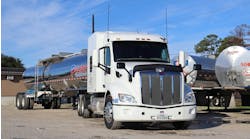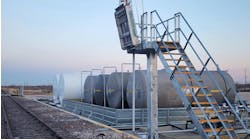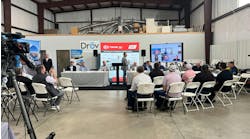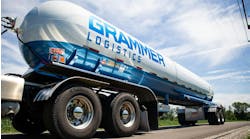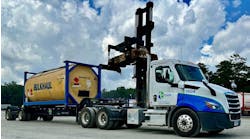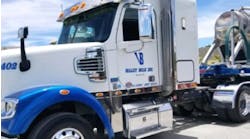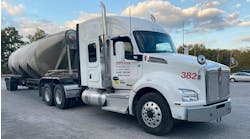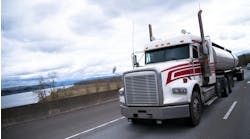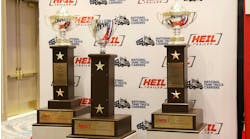Lacy’s Express celebrates past, looks forward to next 50 years
MAY this year brought a milestone celebration for Lacy’s Express Inc. The Pedricktown, New Jersey tank truck carrier reached the half-century mark.
To commemorate 50 years under the Lacy’s Express name, the carrier held an anniversary party in Pedricktown on May 12 that gathered together the customers, employees, and stakeholders that helped build the company into a successful business that is continuing to thrive. The event also demonstrated that the family spirit is still very much alive at Lacy’s Express.
“This milestone would not have been possible without the hard work, commitment, and team effort invested by each one of our drivers, mechanics, and staff,” says William Ferrell Jr, president of Lacy’s Express. “As an organization, we recognize that we could not have come this far without a solid record of safe performance and a team effort by every member of our company.
“We believe the future looks good for our company. We are active in the New Jersey Motor Truck Association, and we have been a member if National Tank Truck Carriers for 30 years. We have been a Responsible Care Partner since 2014.
“We believe family-owned companies can still thrive in the tank truck industry. Second- and third-generation members of our family are very much involved in this operation today, and we see possibilities in the fourth generation.”
Family business
The Ferrell family involvement in trucking began in 1960 when William and Eileen Ferrell (Bill Ferrell Jr’s parents) launched a home heating oil business with a couple of tankwagons. Operating under the Ferrell’s Oil Service name, the business continues to serve customers in the Pedricktown area.
Ferrell’s Trucking was established to haul exempt cargoes, including produce and glass bottles, in the summer months when the heating oil business was slow. In 1968 William and Eileen bought Lacy’s Express Inc, a local less-than-truckload carrier owned by Lacy DePrinzio. That acquisition gave the Ferrell’s Interstate Commerce Commission authority during a time when most trucking operations were still tightly regulated under state and federal law.
Lacy’s Express added tank truck carriage in 1969, serving local companies in the area. The Ferrells shelved the Ferrell’s Trucking brand in 1974 and began operating solely as Lacy’s Express.
Shortly after that, they closed the LTL business and applied for ICC authority in the United States for common contract for liquid bulk. By 1979, Lacy’s Express was well established with liquid bulk, and the carrier started hauling hazardous and non-hazardous waste.
“DuPont (which sponsored Lacy’s Express for Responsible Care Partner) was our first customer, and we pulled DuPont tank trailers with our tractors,” says Bill Jr. “We didn’t buy our first tank trailers until 1980. We’ve always felt that diversifying into tank truck operations was the best move we ever made. Rates for packaged freight had become so cheap at the time, compared to tank truck rates.
“Waste hauling was another very good move, and it now accounts for 75% to 80% of our business. We’re licensed in 23 states for hazardous waste. Most of the liquid wastes go to sites in Pennsylvania and northern New Jersey for disposal. Solid waste shipments go to disposal sites in Alabama and Texas.
“Waste hauling also fueled our expansion into ISO tank containers in the mid-1990s. We started out handling tank container shipments of hazardous waste from Puerto Rico. We offer depot services that include drayage and storage of empty and loaded tank containers at our Pedricktown terminal. We’re permitted to store hazardous waste shipments for up to 10 days.”
Lacy’s Express added the solid waste activity just three years ago. “It’s growing slowly and doing well for us,” Bill Jr says. “We’re hauling primarily contaminated soils in roll-off boxes. Loads come from plant locations and some Superfund sites. We’ll probably buy one more roll-off trailer this year, as well as more roll-off boxes.”
Growing fleet
To keep up with the increasingly diverse customer base, Lacy’s Express continues to add to a fleet that includes 27 tractors, 84 tank trailers, 30 tank container chassis, three dry vans, and two roll-off trailers.
“Our operation is a very manageable size for the sort of hands-on management we prefer,” Bill Jr says. “We would be happy if we could increase the fleet to about 50 trucks. This will continue to be a family operation; it’s in our blood.”
All fleet equipment is based at the Pedricktown terminal, which is set on three and a half acres. Another two-acre site provides additional room for equipment parking and storage.
In addition to offices, the terminal facility includes a six-bay maintenance shop, a vehicle exterior wash bay, and a covered fuel island that than handle two tractors at a time. Intermodal services include a Taylor Model TEC-950 95,000-lb capacity loaded lift for handling tank containers with the ability to stack four high. Tanks are stored in a secure yard. Tank cleaning is handled at a Quala facility in the Pedricktown area, as well as other Quala locations where Lacy’s Express operates.
Operations are concentrated east of the Mississippi River and run south to the Carolinas. Tank trailer shipments of liquid hazardous waste average 500 miles, with 1,500 miles being the maximum. The average round trip for ISO tank drayage is 300 miles.
Coordinating fleet activity is Jason Ferrell, Bill Jr’s son who staffs the Lacy’s Express dispatch office in Pedricktown. The carrier uses TMW Suite dispatch software and the trucks have Rand McNally’s electronic driver log system with GPS tracking.
The dispatch operation is preparing for the electronic hazardous waste manifests that will be mandated later this year by the Environmental Protection Agency. “We are transitioning to the electronic manifests, which will be provided by the waste generators under the mandate,” Jason Ferrell says. “We’ll still have to provide our drivers with a paper copy of the manifest. There is a lot of paper required even with all of the attention being given to electronic documentation.”
Driver management
Like most tank truck carriers, the Lacy’s Express management team says the biggest challenge they face today is finding qualified truck drivers. “Meeting that challenge can make or break a carrier today,” says William “Bill” H Ferrell III, Lacy’s Express sales representative and transportation coordinator. “We have a solid core of loyal drivers, and they give us a very real market advantage.”
Earle “Bud” Kubat, Lacy’s Express safety, compliance, and Responsible Care Management System coordinator, adds that the carrier hires about 20% of the drivers applying for a job. Of the nine new hires since January, ages ranged from 27 to 57 years old and most had tanker experience.
Training for newly hired drivers starts with a two-day orientation, followed by a lengthy stint with a driver trainer. The new hire rides in the passenger seat for at least a week observing how the trainer operates the vehicle and performs loading and unloading functions.
Then comes at least two weeks of driving with the trainer in the passenger seat. Finally, the new hire will drive his own assigned truck accompanied by the trainer in another truck. Driving performance is reviewed at 30-day, six month, and annual intervals.
The new electronic driver log requirements clearly are having an impact on driver job satisfaction and retention, according to Kubat. “We have little or no flexibility with the new rules, and we find that unanticipated delays can consume significant chunks of the 14 hours available to a driver each day. Patience and good communication are absolutely critical today.”
Fleet equipment
Providing the equipment drivers want to operate is even more important today. Lacy’s Express tries to appeal to its company drivers with late-model Peterbilt Model 379 longnose tractors with plenty of comfort features.
“We’ve been running the Pete 379s since 1994, and we replace them on a five-year cycle,” says Bill Ferrell III. “We spec them with PACCAR MX13 engines rated for 455 horsepower, Eaton UltraShift Plus automated transmissions, and 60-inch sleepers with Thermo King Tri Pac auxiliary power units.”
For about a year now, Lacy’s Express has been running Rosco CYL-V forward facing cameras in the cab. “We’ve had a good experience the camera’s,” Kubat says. “We get event alerts through the ELD system on the tractors, and we reward drivers for good performance with a quarterly safety inventive.”
Bendix air disc brakes also contribute to safety and are delivering a 400,000-mile lifecycle. Other tractor equipment includes Dana drive axles, Jost fifthwheel, Alcoa aluminum wheels, and Bendix and Hankook tires.
Lacy’s Express typically doesn’t spec product pumps or blowers on its tractors. WABCO truck compressors rated at 25.9 cfm are used for some product handling, and the tractors do have a hydraulics package that includes a Gardner Denver HydraPak.
Brenner is the primary tank trailer supplier for the fleet. Straight-barrel vacuum and general chemical trailers range in capacity from 6,500 to 7,000 gallons. Brenner’s fiberglass-reinforced plastic vacuum trailers have a 5,000-gallon capacity. Tank hardware includes Betts valves and Girard pressure- and vacuum-relief vents.
Pratt and Chassis King have supplied the tank container chassis used by the fleet. They are spec’d with an air lift at the front for faster container unloading and a 10-ft spread tandem.
Maintenance program
Most of the fleet maintenance is handled in house at the company shop. Lacy’s Express mechanics are authorized to do Peterbilt warranty work. “We have a very good working relationship with Peterbilt,” says Bill Farrell III.
For Lacy’s Express trucks, the mechanics perform routine preventive maintenance inspections at 10,000-mile intervals and engine oil changes every 30,000 miles. In addition to the Lacy’s Express fleet, the maintenance shop services trucks belonging to other companies.
“We’re doing quite a bit of engine and after-treatment system repairs right now,” says Bill Farrell III. “Our shop is certified by diesel engine emission testing by the State of New Jersey.”
On the trailer side, mechanics handle a full range of routine service, including required cargo tank inspections. Hydrostatic tank inspections are contracted out, as are code tank repairs.
